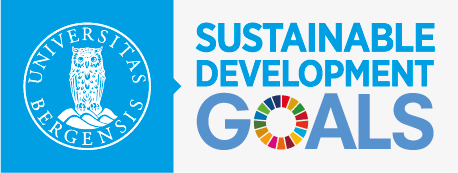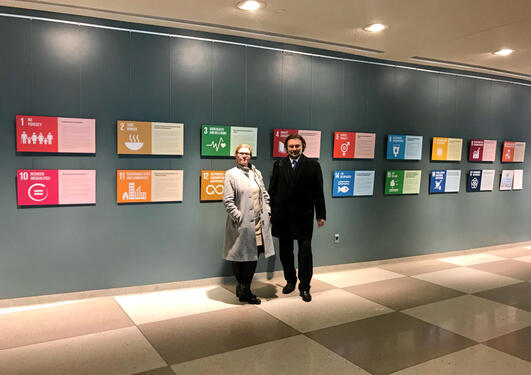UiB assumes leadership in long-term plan
Norway's national Long-term plan for research and higher education has been revised to create a stronger connection between knowledge for sustainable development and scientific advice. SDG Bergen and UiB's leading role is highlighted in the plan.

Main content
“This underlines the university sector's significant role in providing scientific advice on the global societal challenges and we are proud to assume a leading role nationally in this work,” says Rector Dag Rune Olsen at the University of Bergen (UiB).
On Monday 8 October the revised Long-term plan for research and higher education 2019-2028 (LTP) was presented by the Ministry of Education and Research. The plan leads with an ambition to ensure that the Sustainable Development Goals (SDGs) create part of the framework for the plan.
Through the interdisciplinary SDG Bergen initiative, UiB was the first university in Norway to institutionalize an engagement with the SDGs.
SDGs at the centre of plan
The SDGs have been assigned a chapter of their own in the plan and the plan concludes that the university sector plays a vital role in the implementation of the 2030 Agenda. The plan mentions the SDG Bergen initiative explicitly:
“In 2017 the University of Bergen (UiB), launched SDG Bergen, a new mechanism to link the need for new knowledge for sustainable development and interdisciplinary research through scientific advice. UiB has also taken the initiative for a national committee for the 2030 Agenda.”
“We are delighted that SDG Bergen, which is directed squarely at the SDGs, is highlighted in the main national plan for the university sector,” says UiB-Rector Dag Rune Olsen.
“This recognition not only shows that we and the sector as a whole have taken important steps toward engaging with the 2030 Agenda, but commits us to deliver when governments and international bodies ask for scientific advice. As a sector we are presented with a unique opportunity to provide knowledge and science to inform decision-making processes. Our participation ensures that the implementation of the SDGs is based on facts.”
University sector visible at UN
Rector Olsen is delighted to see that scientific advice is a central part of the long-term plan for research. He points to the high-level political forum (HLPF) at the UN in July 2018, where UiB represented the university sector as part of the official Norwegian UN delegation.
Vice-Rector Annelin Eriksen leads the National 2030 Agenda committee for the university sector. She and Professor Edvard Hviding were part of Norway's UN delegation at HLPF. Besides Norway, Switzerland was one of few countries to integrate academia in its HLPF delegation.
“Our participants were splendid on behalf of both the sector and the nation of Norway. To include the university sector directly in the official UN delegation at HLPF has been noted internationally. We are hoping that Norway is a trendsetter for a global trend,” says Rector Olsen.
Among several contributions from the university sector's delegates on behalf of Norway, Olsen highlights the official contribution on science and technology for sustainability by Professor Hviding. In which issues of particular importance for a hi-tech country such as Norway were discussed.
Focus on a sustainable ocean
Given Norway's role as one of the world's foremost Ocean nations, the plan has explicit mention of SDG14: Life below water. This was also the subject for the UN Ocean Conference in July 2017, which brought together stakeholders from diplomacy, politics, academia, industry and civil society.
“At the Ocean Conference we underlined the importance of building partnerships, both with our partners in the university sector and across sectors,” says Rector Olsen.
“It is good to see SDG14 mentioned explicitly in the long-term plan for research. This ties in with our own work in marine research and education as part of our SDG initiatives. Recently we established Ocean Sustainability Bergen, an interdisciplinary research centre to build on current and expand into future partnerships. This is also in accordance with Norway's Prime Minister Erna Solberg, who has established a high-level panel for a sustainable ocean economy.”
A number for voluntary commitments were reached at the UN Ocean Conference between universities and partners across sectors and borders, including by UiB and our partners.
The umbrella organisation International Association of Universities (IAU), consisting of more than 650 member universities from 120 countries, has offered UiB the role of Hub for SDG14. This is to be marked at a major conference in Kuala Lumpur in November 2018, where UiB Rector Olsen will be one of the keynote speakers.


